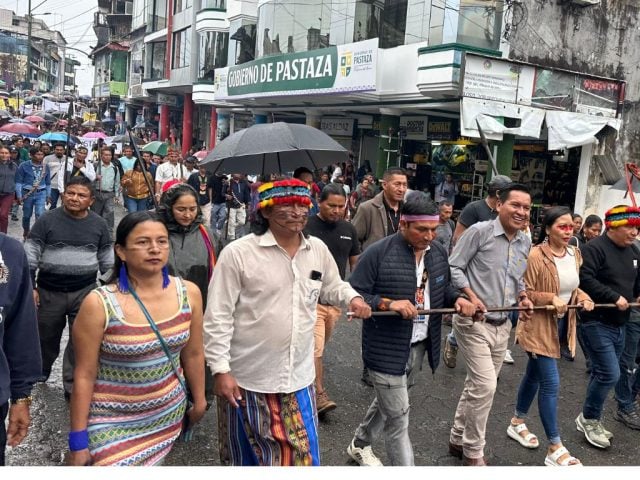Ecuador entered its fifteenth day of a nationwide strike called by the Confederation of Indigenous Nationalities (Conaie), protesting the government of Daniel Noboa after the diesel subsidy was eliminated.
Despite the right-wing president’s refusal to engage in dialogue—and his reliance on repression, including declaring a state of exception in ten provinces—the strike remains active and continues to gather strength.
CONAIE, the principal organizer of the demonstrations, condemned the measure that restricts freedom of assembly 24 hours a day and authorizes the Armed Forces and National Police to intervene in cities and territories where protests are taking place. The group labeled the move a “war policy” aimed at silencing communities through “mass militarization.”
The organization reiterated that the nationwide mobilization, which began on September 22, will continue until Executive Decree 126 is repealed. That decree scrapped the diesel subsidy, driving the price up sharply from $1.80 to $2.80 per gallon. The increase has directly affected transport costs, agricultural production, and household budgets—especially in Indigenous and rural communities that rely on diesel for their livelihoods and mobility.
Plurinational Mobilization in Quito
Over the past weekend, mass demonstrations and gatherings were reported at several locations in Quito, including the Central University, Plaza Indoamérica, and El Ejido Park. More protest actions are expected throughout the week.
In fact, the Kitu Kara People issued a statement inviting collectives, organizations, and federations from all sectors to join a broad, plurinational general mobilization on Tuesday, October 7, starting at 5:00 p.m. (local time) at the Casa del Pueblo Kitu Kara, located at the La Floresta roundabout, on the corner of Coruña and Guipúzcoa.
According to the statement, the purpose of the action is to confront what they describe as a “militaristic, intransigent, and repressive” government that follows the agenda of the International Monetary Fund and allied elites, Radio Pichincha reported.
“We call on all to stand with the popular struggle and sustain the national strike from the city of Quito. Unity is built by prioritizing the cause that brings us together over our differences. Enough with silence and fear of a bellicose, intransigent, and repressive government that is imposing the IMF’s agenda and the elites with whom it governs,” the statement added.
“Only the people save the people! We defeat silence by raising our voices; we overcome fear by walking together,” they emphasized.
The Noboa administration responded by deploying a large contingent of vehicles and military personnel around the venue, as shown in images and footage circulating on social media.
March in the Amazon
In Pastaza province, in Ecuador’s Amazon region, CONAIE president Marlon Vargas led the “March for Life and Territory” in the provincial capital, Puyo.
Representatives of seven Indigenous nationalities from Pastaza joined the peaceful mobilization, reaffirming the strike’s core demands: repeal Decree 126 that ended the diesel subsidy; reduce VAT from 15% to 12%; implement improvements in health, education, and justice; guarantee collective rights; and reject the popular consultation promoted by the Noboa government.
⭕ #ParoNacional2025 | Una multitudinaria movilización se realizó hoy en #Puyo, #Pastaza, por la Vida y el Territorio, en el día 15 del #ParoEcuador.@MarlonVargasEc, presidente de la CONAIE, encabezó la marcha junto a las siete nacionalidades de Pastaza, donde se ratificaron las… pic.twitter.com/RdR7cKamd6
— CONAIE (@CONAIE_Ecuador) October 6, 2025
It is worth noting that lawmakers from the ruling National Democratic Action (ADN) party asked the Attorney General’s Office on Monday to investigate Vargas for terrorism, citing his comments about plans to “take over the city of Quito” if the subsidy removal remains in place.
In response to these allegations, the CONAIE president was unequivocal: “I am always willing to cooperate with justice; I am not a terrorist.”
“To the people of Quito and across Ecuador: our fight is not against the cities, but against years of neglect, poverty, and inequality. We do not want more disappearances or people killed for demanding dignity. We call for the repeal of Decree 126 and a return to a 12% VAT. We fight for life, justice, and peace—not for violence,” he told the crowd in Puyo.

